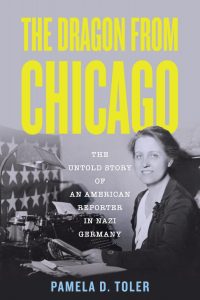May Craig: “Tough as a Lobster”
May Craig (1889-1975) spent most of her career as the Washington correspondent for the Maine-based Gannet newspaper chain. She provided her Maine readers with a keen-eyed and sharp-tongued look at the nation’s capital in her “Inside Washington” column for some forty years.
She was the first woman to attend Franklin Roosevelt’s press briefings, an original member of Eleanor Roosevelt’s Press Circle, a weekly press conference that was only open to women journalists,* and a regular at presidential press briefings from Truman to Johnson. A colleague once described her as “the Washington press gallery nemesis of all evasive politicians.” She was a frequent panelist on Meet the Press. She always wore a hat and gloves on the program. She said it was so that people would remember who she was, as if her pointed and relentless questioning wasn’t enough to make her memorable
As a war correspondent during WWII, she reported on V-bomb raids in London, the Battle of Normandy, and the liberation of Paris, but her primary focus was the experience of Maine’s G.I’s in the European theater.
Throughout her career, she fought to open doors for women reporters, including getting a women’s bathroom installed outside the congressional press galley. Her most important accomplishment for women’s rights was the “May Craig Amendment”, prohibiting employment discrimination on the basis of sex, which became federal law as part of the Civil Rights Act of 1964. Reminiscing late in her career, she said that “Bloody Mary of England once said that when she died they would find `Calais’ graven on her heart.** When I die, there will be the word `facilities,’ so often it has been used to prevent me from doing what men reporters could do.”***
*The press circle gave women journalists access to news and helped save many of their jobs at a time when newspapers were cutting reporters: if newspapers wanted to cover Eleanor they had to hire women reporters. According to Eleanor, the intention was that the conferences would cover subjects of special interest to women and would avoid what she described as “my husband’s side of the news.” They also gave her an unprecedented national platform.
**A reference to the loss of Calais, England’s last continental possession, during Mary Tudor’s reign. The city had been under England’s control since 1347 and was the main port through which English wool was exported.
***In World War II, the United States military did not allow women journalists to travel closer to the front than women service members, which effectively meant field hospitals with nursing detachments. The military justified the policy in terms of the difficulty of providing housing and latrine facilities. (A similar concern fueled regulations against allowing women in combat.)
And lest you think the question of facilities was limited to the battlefield, I offer you this blog post by author Nancy B. Kennedy on the facilities problems suffered by women members of Congress: “Democracy Demands a Pair of Pants.”
My publisher is giving away 25 copies of The Dragon From Chicago on Goodreads. You can sign up here through July 4. Good luck!






